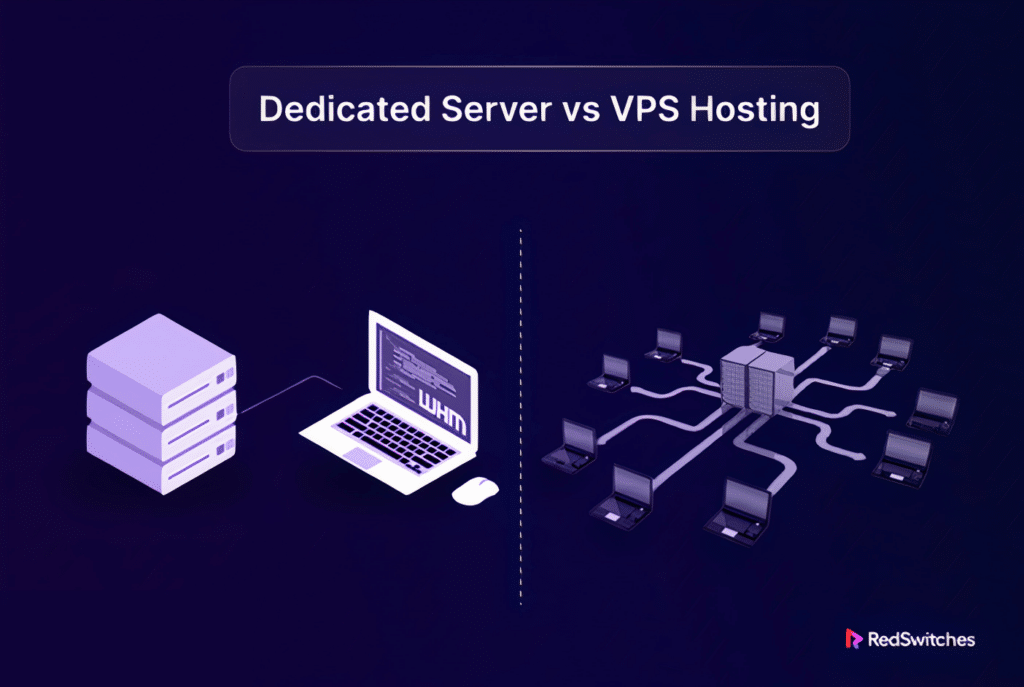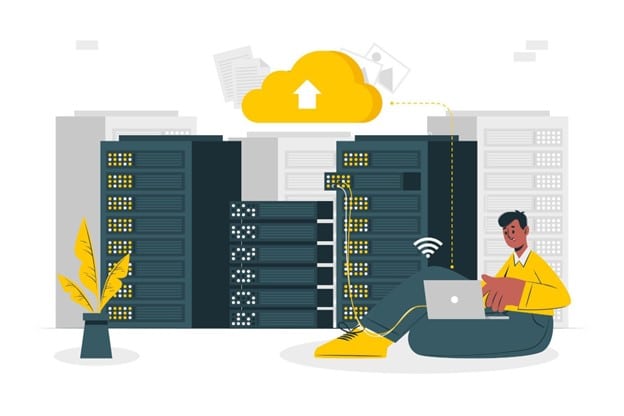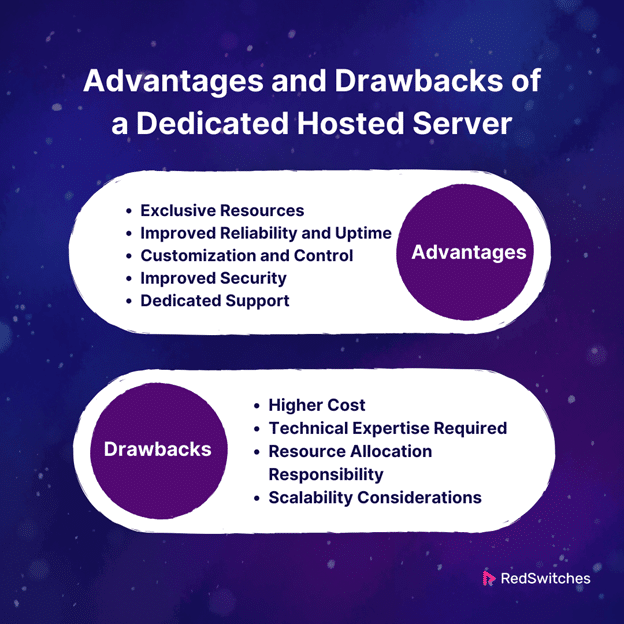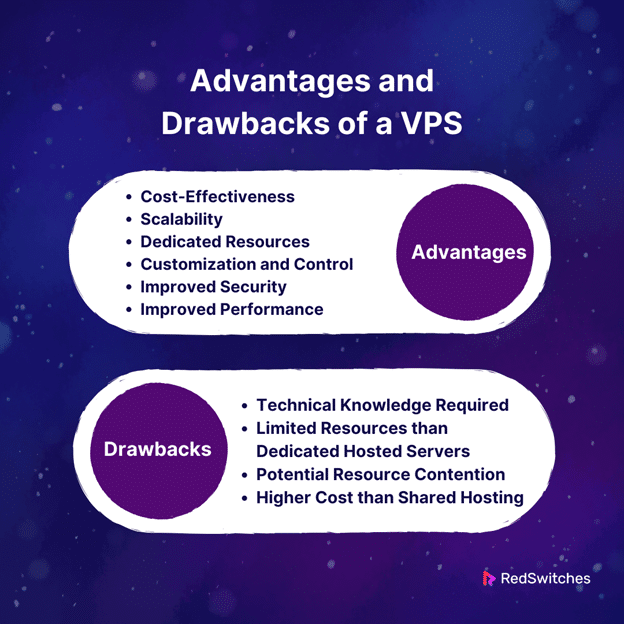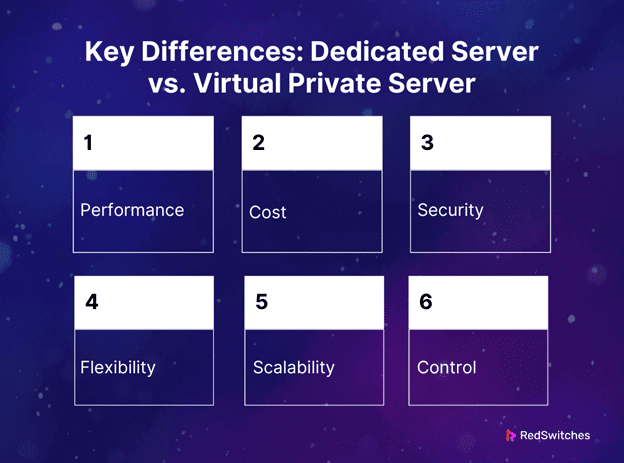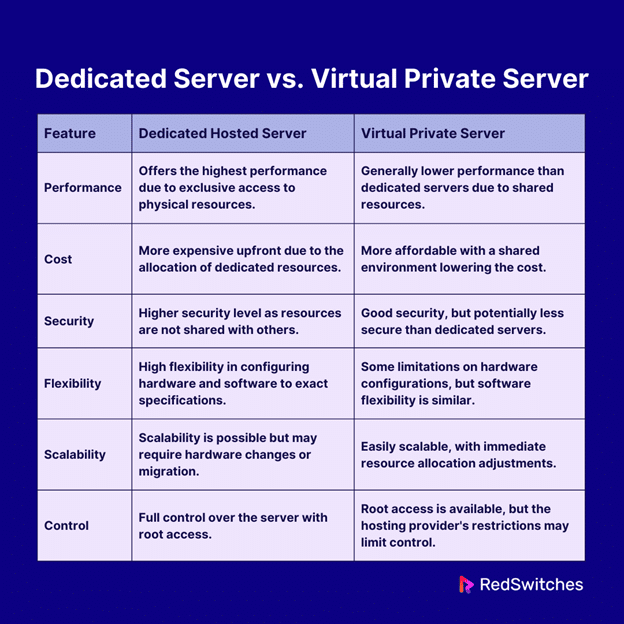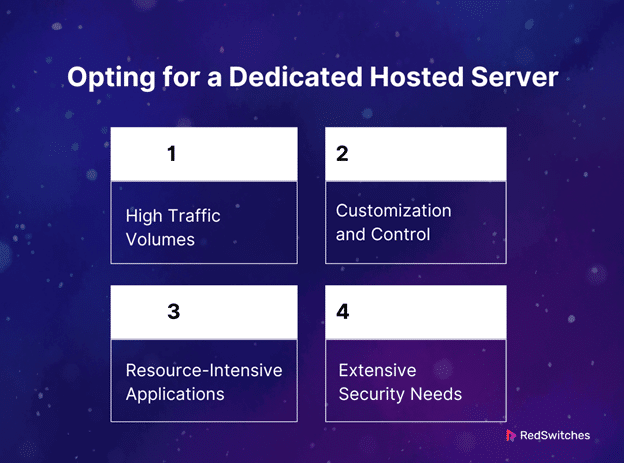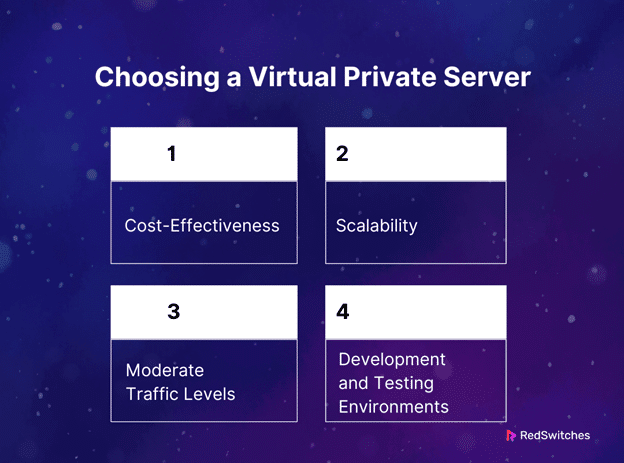Key Takeaways
- A dedicated hosted server is a single physical server exclusively allocated to one user, organization, or application.
- A Virtual Private Server (VPS) functions like a virtual dedicated server. It is a hosting solution that divides a physical server into multiple virtual segments.
- The benefits of dedicated hosted servers include enhanced performance, full customization, and robust security measures.
- Drawbacks of dedicated hosted servers may include higher costs and maintenance responsibilities.
- The benefits of VPS hosting include cost-effectiveness, scalability, and resource isolation.
- Drawbacks of VPS hosting may include potential performance fluctuations and limited resource allocation.
- The differences between a virtual private server vs dedicated server lie in performance, cost, security, flexibility, and scalability.
- Dedicated hosted servers typically offer superior performance but cost more than VPS.
- Dedicated hosted servers provide enhanced security with complete control over server configuration.
- VPS offers flexibility by allowing users to scale resources based on their needs.
- Choose a dedicated hosted server for demanding applications requiring high performance and enhanced security.
- Opt for a VPS when cost-effectiveness and scalability are crucial and performance requirements are moderate.
In the current digital age, where over 5.35 billion people are active Internet users, the foundation of any successful online presence depends on reliable hosting solutions. Among these hosting solutions, it is common for individuals to debate between a dedicated hosted server vs a virtual dedicated server or VPS.
This blog will take you through the nuances of choosing between a dedicated server vs VPS. It will explore the differences, advantages, and potential drawbacks of each. At the end of this blog, you will be well-equipped to select the best hosting solution for your specific needs and objectives.
Table of Content
What is a Dedicated Hosted Server?
Credits: FreePik
Before discussing the differences between a VPS vs dedicated server, it is important to discuss what they mean.
A dedicated hosted server is a single physical server exclusively allocated to one user, organization, or application. This setup ensures the server’s full capabilities, including CPU, memory, and storage, are at the disposal of a single tenant. This exclusivity offers superior performance, improved security, and greater flexibility in terms of software and configurations.
The client has complete control over the server’s environment in this hosting model. This allows for custom software installations, specific security settings, and tailored performance adjustments. This level of control makes it an ideal choice for websites with high traffic volumes, complex applications requiring specific server configurations, or businesses handling sensitive data that necessitates advanced security measures.
The dedicated hosted server model provides a predictable and stable environment for web applications. This is due to the resources not being affected by the demands of other users on the same physical hardware. This reliability and stability are important for businesses that demand consistently high performance and uptime for their online operations.
Do you want to learn about the pros and cons of virtual private servers? Read our blog, Pros And Cons Of Virtual Private Servers: Guide To 2024, for an in-depth guide.
How Does a Dedicated Hosted Server Work?
Wondering how a dedicated hosted server operates? Below, we discuss a dedicated hosted server’s key components and roles:
Key Components and Their Roles
- Central Processing Unit (CPU): Responsible for executing commands and running the operating system and applications. The performance of the CPU directly influences the efficiency and speed with which tasks are performed.
- Random Access Memory (RAM): This serves as the server’s short-term memory. It stores data temporarily for quick access by the CPU. Adequate RAM is crucial for smooth multitasking and handling high-volume traffic.
- Network Connection: A dedicated hosted server is connected to the internet through a high-speed connection. It facilitates the quick transfer of data to and from the server.
- Storage: Comprising Hard Disk Drives (HDDs) or Solid-State Drives (SSDs), the storage component holds all the data and applications. SSDs are often favored for speed. They improve the server’s overall performance.
Advantages of Dedicated Hosted Server
Dedicated hosted servers are popular because they offer abundant benefits. Here are the key benefits of dedicated hosted servers:
Exclusive Resources
A dedicated hosted server allocates resources solely to one client. This exclusivity means your website can leverage the full potential of RAM, CPU, and storage without competing. This ensures consistent performance even during traffic surges.
Improved Security
Security measures can be customized to your unique needs in a dedicated environment. With no other tenants on your server, the risk of cross-site contamination or IP blacklisting due to others’ actions is eliminated. This setup is best for handling sensitive transactions or storing confidential data.
Customization and Control
Having a server completely to yourself allows you to configure the environment according to your requirements. The control is in your hands. You can select the operating system, install custom software, and adjust server configurations. This allows for a perfectly tailored hosting environment.
Improved Reliability and Uptime
The exclusive use of resources reduces downtime risks. Maintenance schedules can be customized. Any potential problems can be addressed quickly without waiting in line behind other users’ support tickets. This ensures your online operations run smoothly.
Dedicated Support
Providers often prioritize support for their dedicated hosting clients. It offers more immediate and specialized assistance. This high level of support ensures any technical challenges are swiftly and effectively resolved. This minimizes potential disruptions to your business.
Drawbacks of a Dedicated Hosted Server
Like any other technological innovation, dedicated-hosted servers may have potential drawbacks. Here are a few drawbacks one must consider before investing in them:
Higher Cost
The most evident drawback of a dedicated hosted server is its price. The exclusivity and high performance come with a higher cost than shared or VPS hosting. Businesses must evaluate whether the benefits outweigh this investment.
Technical Expertise Required
Managing a dedicated hosted server often requires certain technical know-how. Unless you opt for a managed service, you’ll need in-house skills to handle certain tasks. Examples include server setup, maintenance, security, and software updates.
Resource Allocation Responsibility
With great power comes great responsibility. Ensuring that the server’s resources are optimally allocated and not underutilized falls on you or your IT team. Inefficient use can cause wasted resources and unnecessary costs.
Scalability Considerations
Although a dedicated hosted server can handle high traffic and complex applications, scaling up requires more effort and investment than simply adjusting a slider in a cloud hosting environment. Planning for growth involves forecasting and potentially migrating to a more powerful server when the time comes.
What is a VPS?
Credits: FreePik
A Virtual Private Server (VPS) is a hosting solution that divides a physical server into numerous virtual segments. This is achieved through virtualization technology, which allows a VPS to have its own operating system, resources, and configurations, much like a dedicated hosted server. It comes at a more accessible price point and with scalable resources.
A VPS provides dedicated portions of the server’s resources, including CPU time, memory, and storage space. This setup ensures that a VPS user’s data and operations are isolated from others. It offers higher security and performance stability.
A VPS is especially beneficial for small to medium-sized companies, site owners, and developers who demand more resources and control than shared hosting can offer but do not yet need or cannot justify the investment in a fully dedicated hosted server. It offers a balanced compromise, providing the flexibility to scale resources up or down as needed. This makes it an adaptable and cost-efficient hosting solution for various web hosting needs.
How Does a VPS Work?
Wondering how a virtual private server (VPS) operates? Here are a VPS’s key components and roles:
- CPU Allocation: The CPU’s processing power is divided among the virtual environments in a VPS setup. Each VPS receives a dedicated portion of the CPU’s capabilities. This ensures tasks are processed efficiently without undue interference from neighboring virtual servers.
- Storage Space: Each VPS is given a portion of the server’s total storage capacity, often on high-performance SSDs, for faster data access and improved overall performance.
- Operating System (OS): One of the key advantages of a VPS is the ability to choose your OS. Each VPS can run its preferred OS, be it Linux, Windows, or any other. This allows for a tailored environment that suits the specific needs of its applications.
- Network Bandwidth: VPS hosting involves allotting network bandwidth to each virtual server. This ensures reliable and speedy data transfer rates for better website performance and user experience.
- Security and Isolation: Despite sharing a physical server, each VPS is isolated from its neighbors, thanks to virtualization. This isolation boosts security, as any issues or breaches in one VPS do not affect the others.
- RAM Allocation: The RAM is divided among each VPS. This ensures that each virtual server has enough memory to handle its operations. It improves performance and responsiveness.
Advantages of a VPS
Understanding the benefits of a VPS can help you decide on the best hosting solution for your needs. Here are the key benefits of a VPS:
Cost-Effectiveness
One of the most celebrated advantages of a VPS is its cost-effectiveness. It provides the functionalities of a server at a fraction of the price. This makes it a suitable choice for small to medium-sized businesses and personal projects that require more resources than shared hosting can offer.
Scalability
VPS hosting is highly scalable. It allows you to conveniently adjust your resources based on your current needs without the high costs of upgrading a dedicated hosted server. This flexibility is crucial for businesses experiencing growth or with fluctuating traffic patterns.
Dedicated Resources
A VPS has dedicated resources like CPU, RAM, and storage space. It ensures your website’s performance is not affected by other users on the same server. This leads to better stability and reliability compared to shared hosting environments.
Customization and Control
A VPS grants you root access. It offers greater control over your server environment. You can customize your server to fit your unique requirements, including installing custom software and configuring server settings.
Improved Security
VPS hosting provides a safer environment than shared hosting. Since you’re not sharing your operating system with others, there are fewer vulnerabilities to threats. Most VPS providers offer advanced security features, like firewalls and regular backups.
Improved Performance
The dedicated resources of a VPS ensure that your website can tackle higher traffic and more complex processes without compromising on speed or uptime. This is especially vital for websites requiring high performance.
Drawbacks of a VPS
Despite its numerous benefits, VPS hosting has certain drawbacks that should be considered before deciding. Here are some potential drawbacks of a VPS:
Technical Knowledge Required
Managing a VPS usually requires certain technical expertise. Users must be familiar with server administration and management tasks. This can be daunting for beginners who lack the necessary skills or resources to handle potential issues.
Limited Resources than Dedicated Hosted Servers
While a VPS offers more resources than shared hosting, it still falls short of the virtually limitless resources a dedicated hosted server provides. For websites with extremely high traffic volumes or demanding applications, a VPS might not suffice.
Potential Resource Contention
Although VPS users have dedicated resources, the physical server’s resources are still shared among multiple VPS instances. In cases of overprovisioning by the hosting provider, this can generate contention and decreased performance.
Higher Cost than Shared Hosting
While a VPS is more affordable than a dedicated hosted server, it is still more expensive than shared hosting. Small websites with minimal requirements might find shared hosting a more cost-effective solution.
Key Differences: Dedicated Server vs. Virtual Private Server
Both dedicated hosted servers and VPS have unique advantages tailored to different needs and scenarios. Understanding the main differences can help you make an informed decision that fits with your project requirements.
Performance
Let’s look at the differences between a dedicated hosted server and VPS regarding performance
Dedicated Hosted Server
When performance is paramount, a server of this caliber stands out. It allocates all its resources exclusively to one client, ensuring maximum performance. With the entire server’s CPU, RAM, and storage at your disposal, you’re looking at optimal speeds and the ability to handle significant traffic volumes without breaking a sweat. This is crucial for high-traffic websites, large e-commerce platforms, and data-intensive applications.
Virtual Private Server
A VPS partitions a single physical server into multiple virtual environments. Each virtual server operates independently, with allocated resources. While this setup offers improved performance over shared hosting, it might not match the sheer power of a dedicated solution. However, it’s adept at handling moderate traffic and is suitable for small to medium-sized businesses, developers testing environments, and websites with fluctuating traffic.
Cost
Let’s explore how Cost varies between dedicated hosting servers and VPS.
Dedicated Hosted Server
Investing in a dedicated solution has a slightly higher price tag. For example, RedSwitches bare-metal servers start from $100/month. The cost justifies the exclusive access to server resources and the heightened performance and security measures.
It’s an investment suited for businesses that cannot afford downtime and require high performance, security, and control levels. The pricing reflects the comprehensive infrastructure, maintenance, and support that accompanies such top-tier hosting services.
Virtual Private Server
A VPS emerges as a more cost-effective solution, balancing performance and price. It’s designed to provide higher control and resources than shared hosting without the high investment required for a dedicated setup. This makes it an attractive option for startups, small to medium-sized businesses, and any entity with budget constraints but needing a step up in performance and reliability from shared hosting.
Note! Dedicated hosted server and VPS pricing can vary from provider to provider. For detailed information on the dedicated hosted server and VPS pricing, it is best to visit the RedSwitches pricing page or contact the support team.
Security
We’ll examine the Security distinctions between dedicated hosting servers and VPS.
Dedicated Hosted Server
Regarding security, a dedicated solution is often considered the gold standard. With a server at your disposal, you have the ultimate control over the security protocols and measures implemented.
This exclusive access significantly reduces the risk of vulnerabilities and ensures that security configurations are tailored to your needs. This level of security is indispensable for businesses handling sensitive data or requiring stringent compliance with regulations.
Virtual Private Server
A VPS, while more secure than shared hosting options due to its isolated environments, shares a physical server with other VPS instances. This architecture can introduce potential vulnerabilities, as the underlying hardware and network resources are shared among users. However, reputable providers employ advanced virtualization technologies and robust security measures to mitigate these risks, making VPS a secure option for many applications.
Flexibility
Delving into the Flexibility discrepancies between dedicated hosted servers and VPS.
Dedicated Hosted Server
Flexibility is another domain where dedicated hosting shines. With complete control over the server environment, you can customize hardware configurations, choose your preferred operating system, and install any software or applications necessary for your operations. This level of customization makes dedicated hosting ideal for businesses with unique requirements or those looking to optimize their server environment for specific applications.
Virtual Private Server
A VPS also offers a high degree of flexibility, albeit within the constraints of a virtualized environment. Users can select their operating system, install custom software, and adjust settings to suit their needs. While not as extensively customizable as a dedicated hosted, a VPS provides sufficient flexibility for most standard applications and suits businesses seeking a balance between customization and cost.
Scalability
Understanding the Scalability contrast between dedicated hosted servers and VPS.
Dedicated Hosted Server
Scalability with a dedicated hosted server is straightforward regarding raw power: you have the entire server’s resources at your disposal. However, scaling often means upgrading to a more powerful server or adding additional servers to your configuration. While this provides immense capacity for growth, it can be more complex and costly. It requires careful planning and possibly results in downtime during transitions.
Virtual Private Server
VPS hosting shines in scalability. It allows for easier, more flexible, and often instant scaling of resources without physical hardware changes. This makes a VPS an excellent choice for websites and applications with fluctuating traffic or those on a growth trajectory that requires regular adjustments to resource allocations. Scaling on demand helps maintain performance levels without investing in excessive resources upfront.
Control
Let’s dissect the control comparison between dedicated hosted servers and VPS.
Dedicated Hosted Server
Dedicated hosted servers provide excessive control in the hosting environment. As the sole user of the physical server, you have complete autonomy over its configuration, software installations, and security settings. This level of control is unparalleled, making dedicated hosted servers an ideal choice for businesses with specific security requirements or custom software needs. You can also optimize server resources according to your workload.
Virtual Private Server
While Virtual Private Servers offer a high degree of control, it’s within the confines of a virtualized environment. Users have administrative access to their VPS instance. This enables them to install applications, manage databases, and configure security settings.
However, since multiple VPS instances share the resources of a single physical server, there are limitations compared to dedicated hosted servers. Users must follow the virtualization platform’s constraints. This can restrict specific configurations or software installations.
Also Read: Cloud Server Vs Dedicated Hosted Server: Comparing The Differences.
When to Choose a Dedicated Hosted Server vs. a Virtual Private Server
While both options offer unique advantages, understanding when to opt for one over the other can guide you toward a hosting solution that aligns perfectly with your specific needs and objectives.
Opting for a Dedicated Hosted Server
High Traffic Volumes
A dedicated solution is ideal if your website or application experiences high traffic volumes or expects rapid growth. The exclusive resources of a dedicated hosted server ensure that your website can manage extensive traffic without compromising on speed or user experience.
Customization and Control
For those requiring extensive customization, a dedicated environment provides the freedom to configure every server aspect to meet your exact specifications. This level of control is crucial for businesses with unique software requirements or those who need to follow strict security protocols.
Resource-Intensive Applications
Certain applications demand substantial computing power, memory, and storage. Examples include large databases, complex CRM systems, and video processing applications. In such cases, the robust infrastructure of a dedicated setup ensures that resource-intensive applications run smoothly and efficiently.
Extensive Security Needs
When security is a paramount concern, particularly for handling sensitive data, the isolation of a dedicated environment offers higher security. This setup minimizes vulnerabilities and provides the flexibility to implement bespoke security measures.
Choosing a Virtual Private Server
Cost-Effectiveness
For startups, small to medium-sized businesses, or projects with limited budgets, a VPS offers a middle ground between shared hosting and a dedicated hosted server. It provides improved performance and control without the significant financial commitment of a dedicated solution.
Scalability
A VPS is inherently scalable, making it suitable for businesses experiencing gradual growth. You can easily scale resources up or down based on your current needs, ensuring that you only pay for what you use.
Are you confused about the difference between a physical server vs virtual server? Read our blog, ‘Physical Server Vs Virtual Server: What’s The Difference?’, for clarity.
Moderate Traffic Levels
If your site experiences moderate traffic or you’re running a medium-sized blog, e-commerce site, or a small application, a VPS can provide the necessary resources and performance. It’s an ideal choice for websites that have outgrown shared hosting but don’t yet require the full resources of a dedicated hosted server.
Development and Testing Environments
Developers needing a stable, isolated environment for testing and development may find a VPS to be a perfect fit. It offers a dedicated hosted server’s flexibility and root access but at a more accessible price point and can rapidly deploy or dismantle environments as needed.
Conclusion
Deciding between a dedicated hosted server and a virtual dedicated server hosting depends on several factors. This includes understanding your current requirements, anticipated growth, and performance expectations.
Dedicated hosted servers offer outstanding performance, security, and control. This makes them ideal for large businesses or websites with high traffic volumes. VPS hosting provides a cost-effective, scalable solution for those seeking better resources and customization than shared hosting without the price tag of a dedicated hosted server.
RedSwitches is the go-to web hosting provider for growing and established entities navigating this key decision. We cater to a diverse clientele thanks to our spectrum of dedicated hosted servers and VPS hosting solutions.
We ensure that whether your journey demands the robust exclusivity of an affordable dedicated server or the agile scalability of a VPS, your hosting aligns with your aspirations. Contact us today to empower your online presence with the infrastructure it deserves.
FAQs
1. What is a virtual dedicated server?
A virtual dedicated server (VDS) or a Virtual Private Server (VPS) simulates a dedicated hosting environment within a shared physical server. It uses virtualization technology to provide private resources on a server with multiple users.
2. What is the difference between a dedicated server and a virtual server?
The key difference between a dedicated hosted server and a virtual server is resource allocation and environment isolation. A dedicated hosted server provides exclusive access to a physical server’s resources. While operating in an isolated environment, a virtual server shares physical server resources with other virtual servers.
3. What is VDS used for?
VDS (virtual dedicated server) is commonly used for hosting websites, applications, and databases that require more resources and customization than shared hosting can offer but do not require the full resources of a dedicated hosted server.
4. When should I consider switching to a VPS hosting plan?
You should consider switching to a VPS hosting plan when you outgrow the limitations of shared hosting and require more control, security, and customization options.
5. What are the advantages of using a VPS over shared hosting?
Using a VPS provides you with dedicated resources, improved performance, scalability, flexibility, and better security compared to shared hosting.
6. How does a VPS hosting plan differ from a dedicated server hosting service?
A VPS hosting plan provides a virtualized server environment on shared physical hardware, while dedicated server hosting offers an entire physical server exclusively for one user.
7. What are the key points when choosing between VPS options?
When choosing between VPS options, consider your hosting requirements, budget, technical expertise, scalability needs, and the level of control you desire.
8. How does a VPS with AWS differ from other VPS hosting providers?
A VPS with AWS (Amazon Web Services) offers cloud-based hosting solutions with a wide range of services, scalability options, and a robust hosting infrastructure.
9. Why should I choose a VPS over other hosting solutions?
VPS solutions offer more control, flexibility, and dedicated resources than shared hosting. They are also cost-effective and provide a higher level of performance.
10. How do I switch to a VPS from my current hosting solution?
To switch to a VPS, choose a VPS plan, deploy a flexible virtual sandbox environment, and migrate your data and applications to the VPS server.
11. Should I choose VPS or a dedicated hosted server for my hosting needs?
Whether you choose VPS or a dedicated hosted server depends on your requirements. A dedicated hosted server is recommended if you need dedicated resources and complete control over the server. A VPS would be suitable if you want a cost-effective and scalable solution.
12. What operating systems can I use with VPS hosting?
VPS hosting supports various operating systems, such as Linux, Windows, and more, allowing you to choose the one that best fits your needs.
